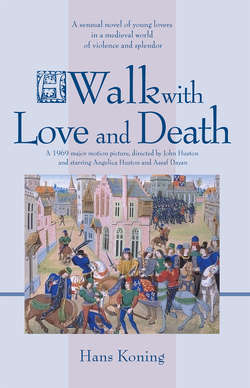Читать книгу A Walk with Love and Death - Hans Koning - Страница 12
На сайте Литреса книга снята с продажи.
7
ОглавлениеNo food was to be found in the village at the bottom of the slope but it showed a surprising measure of normal life. There were women and children outside the huts, I saw hens scratching away in the ditch, and even a cow. Dammartin was legally part of the household of the King of France and that’s why soldiers and such tended to avoid it. At least that’s what I understood from the confusing story a wheezing old villager told me. I had asked him where I could buy bread and he said, nowhere; after that I had difficulty shaking him off for he had seen me descend from the house. He talked and talked at me and ended up warning me very angrily, though I wasn’t quite sure against what or whom. Finally I got rid of him and set off to Montmélian.
Far to my right lay the forest of Chantilly, but the ground there was too hilly and the undergrowth too thick for traveling. I had to stay in the plain though it was dangerous; at two places on the horizon I could see thin columns of smoke rise.
Who could say what was burning there and whether human beings were perishing in the flames? I kept the sun over my left shoulder, going northwest and as close as I could to the wooded area.
I was lucky that day for I saw more fires and they were never near me, and no one stopped me on my way. I didn’t think too much about bandits nor even about my feet; I tried to keep all thought but of Claudia out of my mind.
So I came, unexpectedly fast, to a point where the somber tower of the castle of Montmélian loomed behind a strip of almost leafless old elms covering a hillside. I reached the gatehouse shortly after.
It was different here from Dammartin. There were two walls; a sergeant at the inner wall told me that only gentlemen travelers were received at Montmélian. He wasn’t even rude, he just wasn’t interested. “Call the—” I began but he had already closed the panel in the heavy door.
I walked away. A soldier at the outer gate whistled at me to make me stop. “Don’t go down to the village, fellow,” he said. “They don’t shelter strangers there. Or when they do, they make such a good job of it that you’re sheltered till Judgment Day.” He moved his thumb across his throat and whistled through his teeth.
So I followed the inside of the wall, and found a recess with no wind and the stone still warm from the sun. I covered myself with my jacket. If I don’t think about the cold of the night, I won’t feel it, I said.
I realized then that I had nothing which had belonged to Claudia or could be associated with her, and was furious at myself for not having asked or just stolen something which could be a keepsake. I decided I had to find reasons why my meeting her was not mere chance. I wouldn’t have seen her if I hadn’t stayed so long in that room, I thought, and I stayed only because I had started dreaming about the sea. But the sea is the all-embracing, and the border of the known. Thus it twice symbolizes womanhood. The woman who led me to Dammartin House burned green wood and changed it into charcoal with its lasting glow; that symbolized making love to a maiden. And what had set me on my journey were those words about the snow changing to rain. I had some trouble with that; then I thought that ice changed to water meant a young girl’s cold heart melting into a woman’s tears through her first love. At this point I discovered that all of this was not stopping me from being wickedly cold and uncomfortable; there was a nauseating smell, too, for all along the foot of the wall litter and garbage had been dumped.
I never saw the village. I began my descent to it at dawn; halfway down the hill a group of riders galloped by me, ladies and gentlemen looking quite splendid. I stood still and stared after them, moved by an odd mixture of envy and nostalgia; I was almost run down by a horseman trailing behind and trying to catch up with the others. I thought, perhaps I’d want wealth too, and a house, and a name in that world, while it lasts.
After that I had to cross the road to Senlis, and here met a wagon going north. A man rode beside it who looked quite pleasant; he cried cheerfully, “Want to be in Senlis by nightfall, young man?” I had planned to take the Chantilly road but I suddenly couldn’t bear the thought of walking another step; I climbed on the wagon and soon fell asleep.
At sundown we rattled and squeaked through the south gate into the narrow main street of the town of Senlis. We were just in time. The setting of the sun meant curfew; they closed the gate after us and presently the streets lay deserted.
